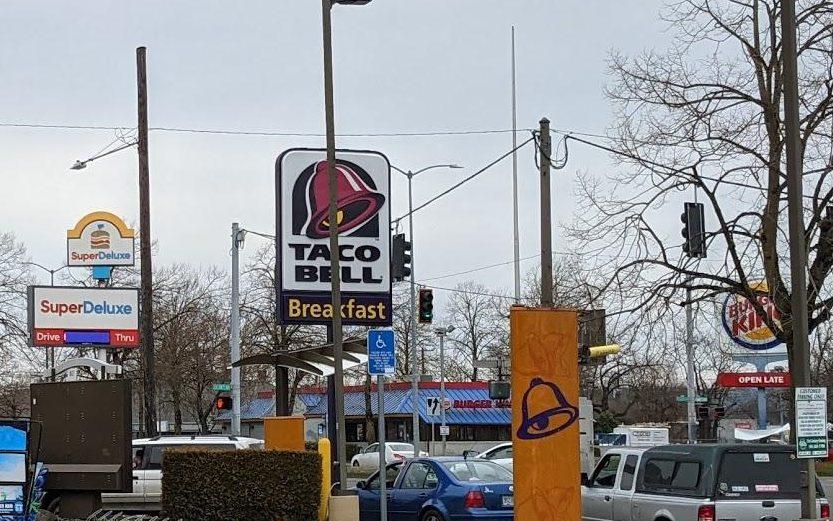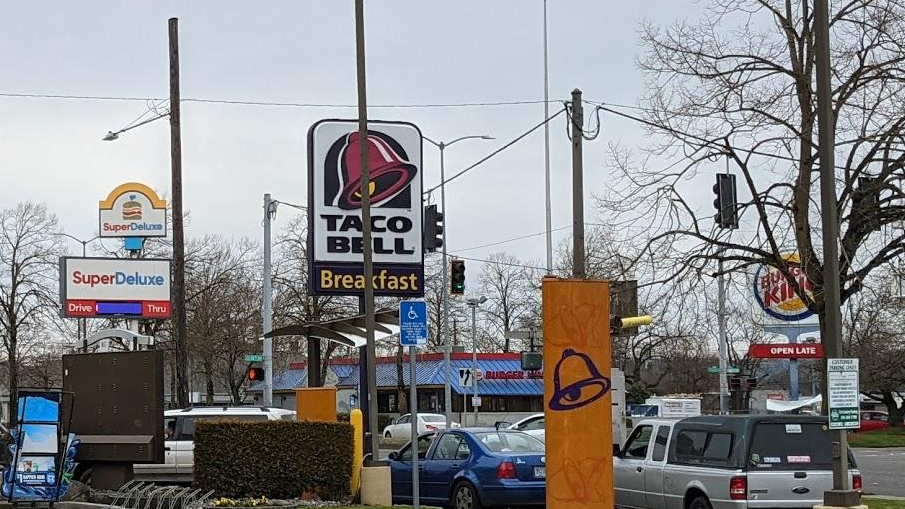
She couldn’t believe what was happening.
Jazmine Carter, a fast food restaurant employee, who is a member of the Franklin Post, had been accused of stealing someone’s credit card. The store’s card reader wasn’t working, so she took the credit card of an elderly white woman inside the building to use the cash register in the front instead. Then, afterward, the woman, whose card Carter had given to her after using it, said she’d taken it. Carter, who is Black, knew it wasn’t true, and she told the store’s management, but they were hesitant to believe her, looking first at security footage to confirm that Carter was innocent. “I don’t know if anybody actually believed me [at first],” she says. “I was like, ‘Why would I steal this lady’s card?’ [Checking the footage] isn’t necessary.” After seeing the exonerating evidence, staff asked the woman to leave, but the woman stayed at the store until Carter’s mom arrived to pick her up.
Carter is one of many high school students, including a number of teenagers who attend Franklin, working in fast food, retail, and other jobs where minors are allowed to work. These jobs are a source of valuable job experience and an opportunity to meet new people, and they’re a source of money. However, difficult customers, long hours, incompetent managers, and inconveniently-timed shifts can turn a longtime teenage activity into a frustrating, disruptive ordeal.
Carter got her first job, at a fast-food restaurant in Portland, in May 2020, during the beginning of the pandemic. She did not have the experience of many of her peers, and that led to some conflicts, including with the supervisor of the branch. The first time they met, Carter was new to the job, and she made a mistake in the drive-thru. “We had headsets where you could talk to other coworkers, and my coworker, she was yelling at me,” Carter says. “And then the [supervisor] started yelling at me, and I started crying.”
Oregon state law requires that employees under 18 years of age have the right to rest and meal breaks, and workplaces must tell their employees about them, but Carter, who is 17, doesn’t remember being told about it, and without the work experience to know that she had that right, she didn’t take many at all at first. “When I first started [working] there, I rarely got breaks,” she says.
Carter, who has since left the job, says she was working six days a week, seven to ten hours a day, rarely reaching ten, though her schedule was inconsistent. Oregon law states that minors ages 16-17 may work no longer than 44 hours per week, but Carter’s estimates place her possibly working longer than that. Those workdays would extend well into the night, even on school days, which disrupts a student’s ability to complete homework on time, while also damaging sleep schedules.
The wide variance in working hours is related to the need to “pick up” responsibilities for absent coworkers. Employees are often late to work or never attend, and it falls on their colleagues to do the work that would otherwise be assigned to the absent employee. A number of staff members take on extra work, but students are not immune to this, and Carter has worked hours above her normal schedule to pick up for others, working in many different parts of the store. Company policy did not prohibit workers from picking up responsibilities of people outside their shifts—someone who works in the morning could pick up work in the evening—which expanded their range of contacts, a risk in the time of COVID-19.
Kaitlyn Molina, another Franklin student, has enjoyed her time at the same place, though workplace relations and her boss have been a source of stress for her. She has considered quitting due to burnout from working one job for a long time.
Molina has had similar experiences with customers. One threw a cup full of sauces at her (they missed) and others have become angry because of a COVID policy that prevents employees from touching materials that had been touched by a customer. Some have had excessive reactions, like one who “called me the B-word for not giving her napkins because we were out of napkins” and not being able to understand orders given over a headset, which compelled a customer to get out of the car “freaking out about us not understanding” what she had said. Molina has had multiple disagreements with a customer who cut off another car in the drive-thru, and the customer, she says, even asked for the company’s corporate number, trying to get her fired.
Staff members such as managers have not always sided with the employee in conflicts with customers, even when the employee might be frustrated about it. “The slogan is, ‘the customer’s always right’… but it’s not true,” says Molina. “…My job is pretty laid back to the point of, ‘We’re not gonna deal with a customer being rude to employees.’”
The fast food place where Molina and Carter worked—Molina sent in her two days’ notice on March 5—has since moved on from a boss who never told Molina how to take paid time off, or about sick leave. Oregon state law requires that employers tell their workers about paid sick time accrued at least once every four months. “It was never discussed with me,” she says. “[My] bosses have not always been the best about giving me information about that.” She says she’s been locked out of her account for the website where employees track earnings and paid time off more than once.
Molina’s relationship with the person in charge of multiple locations is better than Carter’s. “We’ve agreed on a couple of things,” she says, including that late arrivals are a “big problem.” Still, the manager “keeps people on their toes,” says Molina.
Molina is glad that she took the job. The opportunity to interact with others, she says, especially during the year-long quarantine due to COVID—she says she took the job in November 2019—has been beneficial to her, though she says it’s “just like high school,” with “the same amount of drama,” which contributed to why she’s left the job.
Carter has taken a job at another fast-food restaurant, where she’s working five days a week instead of six. Her supervisors regularly remind her she can go on break, and she says even the customers have been kinder. Still, Carter is working into the night, even on school days. She feels conflicted about her old job, saying she “made so many friendships with people [she] didn’t think [she] would ever become friends with.” She prefers her new workplace and does feel glad that she quit.
Fast food unions, while gaining steam as a possibility even in larger companies, are rare. The nation’s first was the Burgerville Workers Union, and Little Big Burger employees have followed suit, beginning the movement in the Pacific Northwest. But most national and multinational chains have not been unionized, giving employees less leverage against their bosses that could help expand pay and benefits.
SuperDeluxe, a local fast food chain, says they have 5-10 high school students at a Portland location. They try to limit hours for all employees. “We employ only 16-17-year-old workers who are not limited on the number of hours they may work in a day… as such they work similar length shifts of other team members, 6-8 hours in length,” wrote a representative in an email. “We never schedule any team member—minor or adult—for more than 40 hours.” They said that they do stagger hours such that an employee cannot take on extra shifts in the other part of the day, so a morning shift employee could not work in the evening. Carter, who works there now, agrees. They offer paid sick leave and pay $14 per hour plus tips, according to the representative’s statement. (Multiple other companies did not respond to requests for comment.)
Innana Rose has worked in the restaurant industry as a waitress and manager at her parents’ business and for a flower shop. She has had benefits, and when she hasn’t been the manager, she’s been reminded about breaks. However, as a former member of the restaurant industry, Rose has dealt with rude customers. “Food customers suck,” she says. “In the restaurant jobs, it was very negative. [There] was lots of yelling and being aggressive and not tipping.” Some would become angry when she asked them to wear a mask, she says, and the restaurant received hate mail when they put up a sign supporting the Black Lives Matter movement. “They were like, ‘you are promoting a Marxist organization. Take it down,’” she says. “No.”
Rose realized in that job, she says, “how brutal the [service] industry can be.” Still, she is glad that she took the restaurant job, even if she prefers to work at the floral shop, where instead of managing the front of the house, she can work under people. “It’s way less stressful,” she says. “I don’t feel responsible for other people.” Rose says that the customers at the boutique are much nicer, but if the restaurant were to reopen—it is currently closed due to the pandemic—she may return.
Teenagers can get experience from jobs, experience that is valuable both for themselves and for their resume. They can get money that may significantly improve their quality of life. Jobs can also involve stress, bad sleep, and bosses who do not ensure they receive adequate working conditions. The least experienced demographic in the market, teens, may be left with fewer alternatives in the workforce, which makes exploitative practices from managers easier. One such manager was fired, but many more remain, and while teens do benefit from jobs, some are likely still facing similar conditions to those of Carter and Molina today. Especially during a time when controversial safety measures are being taken, working in the food industry can be a consistent source of frustration.


































